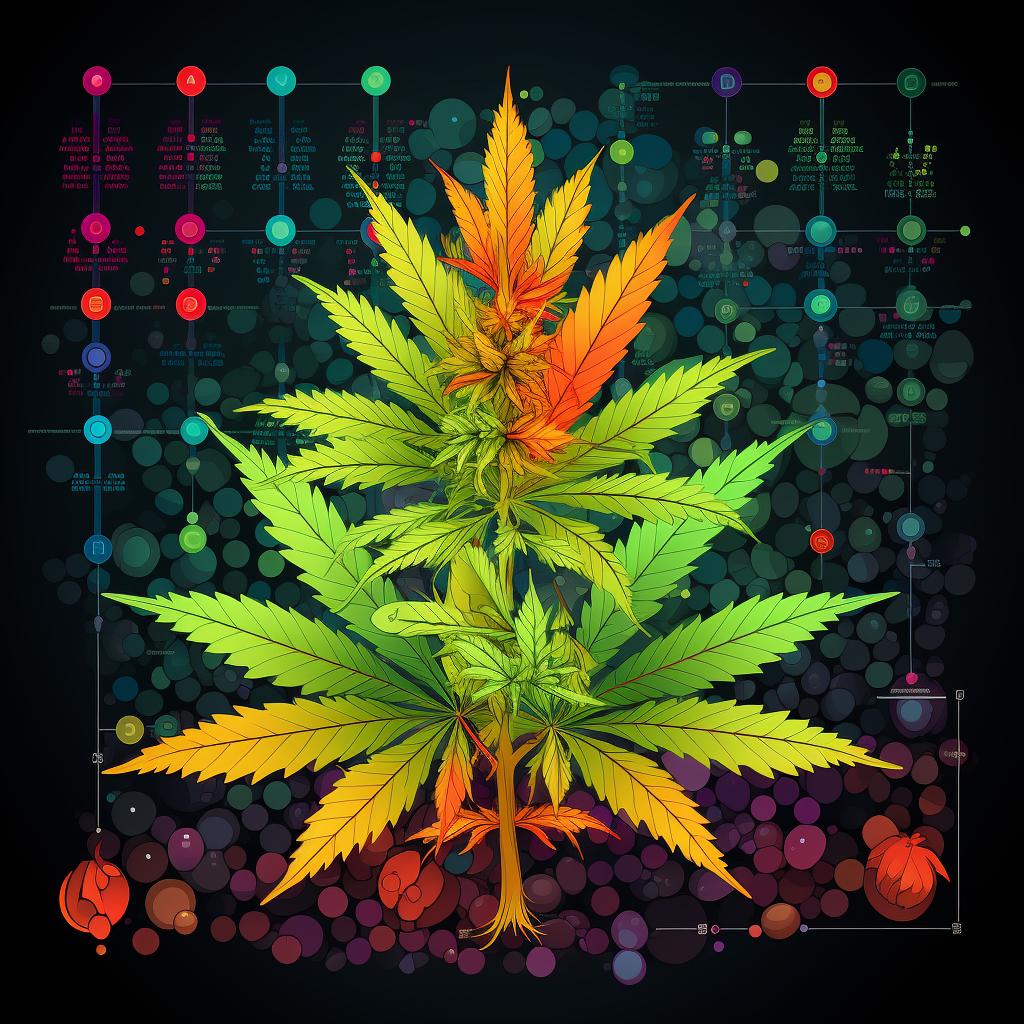In the realm of medical science, the rediscovery of cannabis as a potent therapeutic agent marks a fascinating chapter in the quest for healing. Far from its controversial past, medical cannabis now emerges as a beacon of hope for patients worldwide, offering relief where conventional medicine sometimes falls short. At the heart of this green revolution lie cannabinoids, the chemical compounds unique to the cannabis plant, each with its distinct therapeutic potential. This article delves into the scientific tapestry of cannabinoids, unraveling their medical benefits and illuminating the future of cannabis in medicine.


Table of Contents
ToggleUnveiling the Cannabinoid Spectrum
Cannabis contains over a hundred cannabinoids, but two in particular have captured the spotlight: delta-9-tetrahydrocannabinol (THC) and cannabidiol (CBD). THC, the main psychoactive ingredient, is renowned not just for its mind-altering effects but also for its medicinal properties, including pain relief and nausea control. CBD, on the other hand, offers a non-intoxicating alternative, with a broad portfolio of therapeutic effects ranging from anti-inflammatory and analgesic to anxiolytic and antipsychotic properties.
THC: The Trailblazer in Symptom Management
THC mimics the action of anandamide, a naturally occurring neurotransmitter, thereby influencing mood, memory, and pain perception. Its efficacy in managing chronic pain, particularly neuropathic pain, has been a cornerstone in medical cannabis therapy. Additionally, THC plays a pivotal role in alleviating chemotherapy-induced nausea and vomiting, a lifeline for cancer patients undergoing treatment.
CBD: The Therapeutic Powerhouse
CBD’s mechanism of action is distinct from THC, interacting with various receptors in the body to exert its effects. Its anti-inflammatory properties are particularly beneficial in treating conditions like rheumatoid arthritis and Crohn’s disease. Moreover, CBD’s ability to mitigate seizures has revolutionized the treatment of rare pediatric epilepsy syndromes, such as Dravet and Lennox-Gastaut, offering a ray of hope to families desperate for a solution.


Beyond THC and CBD: The Entourage Effect
While THC and CBD stand out for their medicinal benefits, the cannabis plant harbors a constellation of other cannabinoids, each contributing to the plant’s therapeutic potential. Cannabinol (CBN), Cannabigerol (CBG), and Cannabichromene (CBC) are among the lesser-known compounds making significant strides in research for their health benefits.
CBN: The Sleep Enhancer
CBN, a byproduct of THC degradation, has garnered attention for its sedative properties, making it a potential treatment for insomnia and sleep disorders. Though research is in its infancy, CBN’s promise in enhancing sleep quality without the psychoactive effects of THC offers a natural alternative to pharmaceutical sleep aids.
CBG: The Anti-inflammatory Innovator
CBG, often referred to as the “mother of all cannabinoids,” is the precursor from which all other cannabinoids are synthesized. Its anti-inflammatory and neuroprotective properties are under investigation for potential applications in treating inflammatory bowel disease, neurodegeneration, and even certain types of cancer.
CBC: The Mood Booster
CBC has shown promise in contributing to the overall mood-enhancing effects of cannabis through its interaction with the body’s natural endocannabinoid system. Its potential in treating depression and anxiety, coupled with anti-inflammatory and analgesic effects, underscores the multifaceted benefits of cannabinoids beyond the well-trodden paths of THC and CBD.


Embracing the Future of Medical Cannabis
The exploration of cannabinoids and their medical benefits is a testament to the complexity and potential of cannabis as a therapeutic agent. As research deepens and stigma fades, the future of medical cannabis shines brightly, promising a more nuanced and personalized approach to medicine. In this new era of healthcare, cannabinoids stand at the forefront, offering a spectrum of hope and healing that could redefine the boundaries of medical treatment. With enthusiastic and ongoing scientific inquiry, the potential of cannabis to alleviate suffering and improve quality of life is boundless, heralding a future where medicine harnesses the full spectrum of nature’s bounty.
FAQ: Understanding Medical Cannabis and Cannabinoids
What are cannabinoids?
Cannabinoids are a group of chemical compounds found in the cannabis plant. They interact with the body’s endocannabinoid system, influencing various physiological processes, including pain sensation, mood, appetite, and memory. The most well-known cannabinoids are THC (delta-9-tetrahydrocannabinol) and CBD (cannabidiol).
How do THC and CBD differ?
THC is the primary psychoactive component of cannabis, responsible for the “high” associated with marijuana use. It has medical benefits such as pain relief and nausea control. CBD, on the other hand, does not produce a high and has a wide range of therapeutic effects, including anti-inflammatory, analgesic, and anxiolytic properties.
What medical conditions can medical cannabis treat?
Medical cannabis is used to treat a variety of conditions, including chronic pain, epilepsy, multiple sclerosis, arthritis, chemotherapy-induced nausea and vomiting, and certain psychiatric disorders like anxiety and depression. The specific benefits depend on the type of cannabinoids and the individual patient’s condition.
Is medical cannabis legal?
The legality of medical cannabis varies by country and, in some cases, by region within a country. Many places have legalized medical cannabis with a prescription from a healthcare provider, but it’s important to check local laws and regulations.
Can medical cannabis cause side effects?
Like any medication, medical cannabis can cause side effects. Common side effects include dry mouth, dizziness, altered perception, and memory impairment. The risk of side effects can vary depending on the cannabinoid profile, dosage, and the individual’s response.
What is the entourage effect?
The entourage effect refers to the theory that all the compounds in cannabis, including cannabinoids, terpenes, and flavonoids, work together synergistically to produce a greater therapeutic effect than any single compound alone. This suggests that whole-plant extracts may offer more significant benefits than isolated cannabinoids.
How is medical cannabis administered?
Medical cannabis can be administered in several ways, including inhalation (smoking or vaporizing), oral (edibles or capsules), sublingual (tinctures or sprays), and topical (creams and balms). The method of administration can affect the onset and duration of effects.
Can anyone use medical cannabis?
Not everyone is a suitable candidate for medical cannabis. Its use should be evaluated by a healthcare professional, considering the individual’s medical history, current condition, and potential interactions with other medications. Patients with a history of substance abuse or certain psychiatric conditions may need to exercise caution.
How do I get a prescription for medical cannabis?
The process for obtaining a medical cannabis prescription varies depending on local laws. Generally, it involves consulting with a healthcare provider who is knowledgeable about cannabis medicine. The provider will assess your condition and determine if cannabis is a suitable treatment option.
Are there alternatives to THC and CBD for medical treatment?
Yes, there are other cannabinoids like CBN (cannabinol), CBG (cannabigerol), and CBC (cannabichromene) that offer various therapeutic benefits, including sleep aid, anti-inflammatory, and mood-enhancing effects. Research into these and other cannabinoids is ongoing, expanding the potential therapeutic applications of cannabis.
Kannabu's Online Cannabis Educational Resources
Read Educational Online Guides and Articles to Learn About Cannabis
- Navigating the Green Path: CBD vs. THC in Medical Treatment
- The Aromatic Architects of Healing: The Role of Terpenes in Medical Cannabis
- Navigating the Green Frontier: Clinical Trials on Cannabis and Its Effects
- Charting the Green Path: Cannabis Dosing Guidelines for Medical Use
- The Endocannabinoid System: Nature’s Balancing Act in Human Health
- A Green Horizon: Cannabis as an Alternative to Opioids
- Navigating the Mind’s Garden: Cannabis and Mental Health Treatment
- Unlocking the Green Code: Exploring the Genetic Diversity and Pharmacological Promise of Cannabis
- Weaving Green into Gold: The Integration of Medical Cannabis into Traditional Medicine
- The Therapeutic Promise of Medical Cannabis: Exploring the Spectrum of Cannabinoids
- From Young to Old: The Compassionate Embrace of Medical Cannabis in Pediatric and Geriatric Care
- Green vs. Traditional: Navigating the Crossroads of Medical Cannabis and Conventional Therapies
- Beyond the Pain: The Comparative Effectiveness of Cannabis in Chronic Pain Management
- Unlocking Cannabis’s Secrets: The Journey Through Cannabinoid Pharmacokinetics and Pharmacodynamics
- Green Paws: Navigating the Frontier of Medical Cannabis in Veterinary Care
- Unlocking Relief: The Transformative Role of Medical Cannabis in Pain Management
- Harnessing Harmony: Medical Cannabis and the Battle Against Autoimmune Disorders
- Embracing the Night: How Medical Cannabis Transforms Sleep Management
- Turning the Tide: Cannabis as a Catalyst for Relief and Recovery in Nausea and Appetite Stimulation
- Illuminating the Neural Pathways: The Transformative Role of Medical Cannabis in Neurological Conditions
- Harnessing Harmony: Medical Cannabis and the Battle Against Autoimmune Disorders
- A Clearer View: Medical Cannabis in the Treatment of Glaucoma
- Breaking Boundaries: Cannabis and the New Frontier in Epilepsy and Seizure Control
- Revolutionizing Relief: Medical Cannabis in Cancer Symptom Management
- Navigating the Storm: Cannabis as a Beacon of Hope in Multiple Sclerosis Treatment
- Cannabis: A Natural Respite for Arthritis and Joint Pain
- Healing from Within: The Role of Medical Cannabis in Treating Gastrointestinal Disorders
- Healing Invisible Wounds: Cannabis in PTSD and Trauma Treatment
- Balancing the Mind: The Potential of Medical Cannabis in Bipolar Disorder and Mood Stabilization
- Illuminating the Mind: Cannabis in the Treatment of Alzheimer’s and Neurodegenerative Diseases

